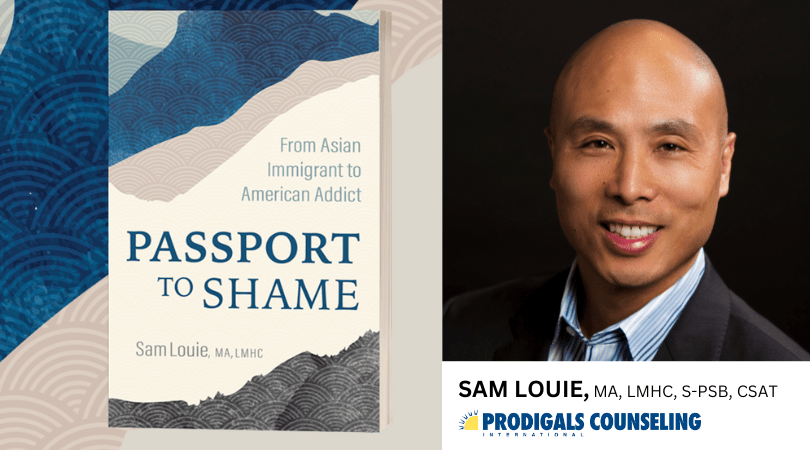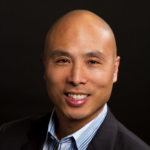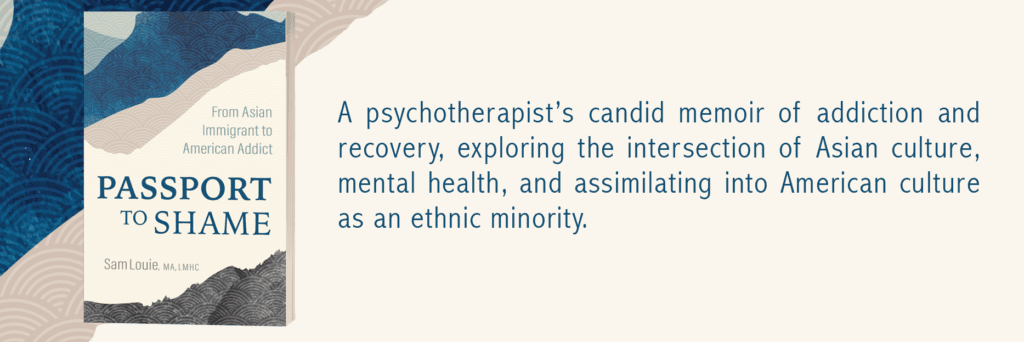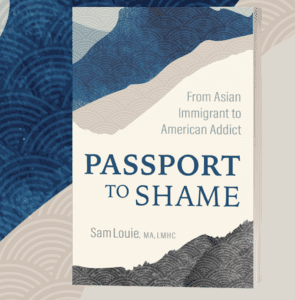

by Sam Louie, MA, LMHC, CSAT
Prodigals International Counseling
Thoughts and excerpts from Sam Louie’s new book Passport to Shame: From Asian Immigrant to American Addict, discussing his childhood as an Asian-American immigrant and the culture of shame and secrecy that led him down the path to sex addiction.
“I hate myself!”
“I wish I could scrub off my yellow skin!”
“Stop speaking Chinese to me, Mom and Dad!”
These were some of my earliest thoughts as a Chinese boy in the United States. I wasn’t white like those I saw on television. I wasn’t Black like those in my neighborhood. I was an Asian immigrant. I was an outsider, a foreigner, the “other.”
I hated looking different, speaking differently, and having different customs and traditions from mainstream America. In Hong Kong, we were part of the Chinese majority. But this all changed when my parents decided to move the family to America when I was a toddler. The first English words I heard were, “Ching, chong, chong!” Not exactly the most welcoming reception. The first question I recall a classmate asking me was whether we ate rats or dogs. I cringed and began distancing myself from my Chinese background.
This cultural contempt and self-loathing became more evident when my parents spoke to me and my brothers in Chinese and I responded in English. I was embarrassed and ashamed of our heritage. I winced when they spoke Chinese in public. I wanted nothing to do with them in any setting, public or private.
To ease the perceived tension, I did my best to respond in perfect English, thinking that by doing so everyone would view me as a legitimate American. But it didn’t matter if I could speak English without an accent as I looked like a foreigner and was viewed as one.
Learning to self medicate to calm the fear
My parents worked endless hours at Chinese restaurants. Dad was a cook and mom was a waitress. They had no paid vacation or medical care. As young as I can remember, I recall having to look after my two younger brothers as my parents worked. I was scared thinking I was just a kid and crime was rampant in the neighborhood. What if someone robbed us? I had nothing but a slingshot to protect us. The fear of being home alone with my two younger brothers weighed heavily on me.
 To ease the fear and self-soothe, I began compulsively biting my nails starting around eight years old. Other means to self-medicate my feelings were watching endless hours of television, playing video games, listening to music, and looking at department store catalogs. I would read the descriptions of toys and other gadgets I wanted and just fantasize about what it would be like to have them. It was the way my system found comfort. You can call it dependency, or compulsion. I didn’t care what you labelled it, all I knew was it drowned out the gripping fear of being alone and unsupervised while also giving me an outlet to quiet the negative feelings I had about myself as a minority in the United States. They were a means for me to self-medicate any negative feelings I had about myself or what I perceived the world thought about me.
To ease the fear and self-soothe, I began compulsively biting my nails starting around eight years old. Other means to self-medicate my feelings were watching endless hours of television, playing video games, listening to music, and looking at department store catalogs. I would read the descriptions of toys and other gadgets I wanted and just fantasize about what it would be like to have them. It was the way my system found comfort. You can call it dependency, or compulsion. I didn’t care what you labelled it, all I knew was it drowned out the gripping fear of being alone and unsupervised while also giving me an outlet to quiet the negative feelings I had about myself as a minority in the United States. They were a means for me to self-medicate any negative feelings I had about myself or what I perceived the world thought about me.
As I entered puberty, I still worried about getting robbed, but my arsenal besides the slingshot included a BB gun rifle. I still didn’t feel safe as I would wake at any hour of the night if I heard any noise outside. In terms of compulsive behaviors, my obsession with video games, music, and television cartoons gave way to romantic intrigue in the form of soap operas such as The Young and the Restless and Days of Our Lives. The shows had themes of love, connection, and drama. I believed the closest form of intimacy between two people was when they were being romantic. These soaps had me transfixed like never before. I saw love, or what I thought was love, being demonstrated in the form of romance. When the actors kissed, I viewed this as the most intimate act of human connection. Is this what was needed for me to be close to another human being?
Confusing connection and intimacy, with sex
I was only 10 years old when the connection between romance and sex as the ultimate expression of closeness was formed in my mind. I was too young, shy, and poor to feel a girl would like me, so I never entertained the thought of kissing a real girl. Nudity wasn’t as accessible as it is today, but some friends had cable TV where pornographic movies were “scrambled” (i.e. a form of encryption to control access to paid content). While we couldn’t see anything, we could hear the moans and groans of sex in the background. This felt like the solution to all the aches in my heart. Sex and sexual stimulation felt like they fit perfectly for my needs, like a key to a lock. I felt safe, wanted, loved, and free of worry from all external issues. In other words, I was hooked.
From my teenage years up until my early 30s, I drowned away all my worries and anxieties in sexual escapism such as pornography, and the hiring of escorts. It wasn’t until my divorce that I was forced to confront my demons, so to speak. Beyond the sexual compulsions, I addressed the deeper cultural and personal issues that drove me to fantasy and escapism. It wasn’t until therapy that I realized I wasn’t defective and flawed due to my actions but that I had not developed any healthier coping skills than sexual self-soothing. Only after the hard work of grieving the relational losses of family disconnection due to a language barrier and freeing myself from traditional Chinese stoicism, which can shame us from sharing our thoughts and feelings, did I finally garner a sense of self. Being in honest relationships where I could be fully known for all my “defects,” yet still loved and wanted, brought me a new freedom that I had so craved earlier in life.
Now as a CSAT (Certified Sex Addiction Therapist) working with Prodigals International, my goal is to give Christian men a space where they can be honest and vulnerable not just with me but also with other men in recovery. It’s in this form of community and intimacy where healing can give evidence to Christ’s redemption in our own lives.
 Purchase Passport to Shame, available on AMAZON.COM
Purchase Passport to Shame, available on AMAZON.COM
Sam Louie, MA, LMHC, CSAT is a Certified Sex Addiction Therapist with Prodigals International Counseling specializing in helping men with problematic sexual behaviors see beyond their sexual brokenness and recognize the sanctity of their souls. He also leads a Wednesday evening Christian Men’s Sex Addiction Therapy Group – Journey to Recovery. Sam is a first-generation, Chinese-American immigrant who grew up in South Seattle amidst three generations of addictions, bringing significant understanding and experience helping people address trauma, addictions, cultural and relationship issues.

